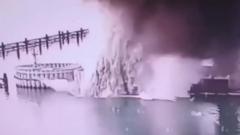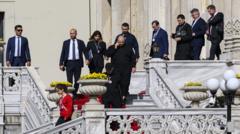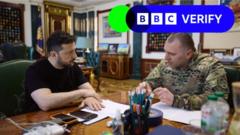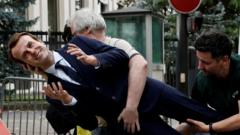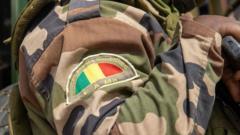**This article explores the silent resistance faced by individuals in Russian-occupied cities like Melitopol, Mariupol, and Crimea, where residents engage in small acts of defiance against an oppressive regime.**
### The Quiet Struggles of Ukrainians Under Russian Control: Acts of Resistance in Occupied Territories

### The Quiet Struggles of Ukrainians Under Russian Control: Acts of Resistance in Occupied Territories
**Ukrainians living under Russian occupation navigate fear and defiance amid escalating repression and forced assimilation.**
In the heart of Ukraine, where a fifth of the territory remains under Russian control, individuals are forced to navigate a perilous existence shaped by fear and the specter of repression. The struggles of these Ukrainians are starkly illustrated through the experiences of three individuals—Mavka, Pavlo, and Iryna—who shared their realities of life under occupation with the BBC, omitting their real names for safety reasons.
The atmosphere in occupied cities is one of increasing militarization and a systematic push for "Russification." In Melitopol, Mavka is witnessing a transformation as schools now celebrate Russian identities, marked by mandatory military drills for children and propaganda encouraging conscription. This unsettling integration into a foreign regime betrays her sense of belonging to her home, which she clings to despite the invasion.
Meanwhile, Pavlo describes the port city of Mariupol as "cut off" from the rest of the world, operating under stringent new laws that compel the population to adopt Russian citizenship for access to basic services like education and healthcare. He speaks of a pervasive atmosphere of fear where even minor acts of dissent—such as a child not participating in the morning anthem—can threaten family safety. Conversations in Mariupol now revolve around property rights amidst rising unemployment and destruction from the war.
Iryna, living in Crimea since its annexation in 2014, exemplifies the tension felt across occupied territories. She is forced to conceal her Ukrainian identity, practicing cultural traditions in quiet defiance. She recounts instances of intimidation and potential violence, revealing how daily life intertwines with navigating the oppressive watch of Russian authorities—a delicate dance that involves praying for safety while cherishing aspects of her identity.
Amid such challenges, Ukrainians find means to resist the occupation, often through collective efforts. Mavka belongs to a covert network of women dubbed Zla Mavka, which seeks to foster a sense of solidarity among residents. The group's activities range from disseminating Ukrainian symbols to subtler forms of defiance, like tampering with food intended for Russian soldiers, illustrating the creative lengths they go to resurface a spirit of Ukrainian identity.
However, the stakes are incredibly high. The risk of disappearance or brutal repercussions looms large over any act perceived as resistance, especially given the fate of journalists and activists at the hands of occupying forces. Mavka articulates the fear of sudden silence when someone vanishes—an ever-present threat that prevents open dissent.
The perspectives of these Ukrainian individuals on a potential ceasefire diverge significantly. Mavka fears it might legitimize Russian occupation and further erode Ukrainian sovereignty. In contrast, Pavlo, advocating for peace even at a significant personal cost, raises profound questions about the value of human life amidst political turmoil.
Iryna reflects on the psychological scars inflicted on the younger generations growing up in an environment of violence and militarism—children turning from innocent play into agents of hostility, as exemplified by a child who shot her pet.
In their shared narratives lies a profound resilience. While they face systemic attempts to erase their identity, the spirit of defiance and solidarity remains undimmed as they navigate the complexities of living under occupation. Their experiences highlight the intricate balance between survival and resistance, shedding light on a population that continues to fight for its identity and future against overwhelming odds.
The atmosphere in occupied cities is one of increasing militarization and a systematic push for "Russification." In Melitopol, Mavka is witnessing a transformation as schools now celebrate Russian identities, marked by mandatory military drills for children and propaganda encouraging conscription. This unsettling integration into a foreign regime betrays her sense of belonging to her home, which she clings to despite the invasion.
Meanwhile, Pavlo describes the port city of Mariupol as "cut off" from the rest of the world, operating under stringent new laws that compel the population to adopt Russian citizenship for access to basic services like education and healthcare. He speaks of a pervasive atmosphere of fear where even minor acts of dissent—such as a child not participating in the morning anthem—can threaten family safety. Conversations in Mariupol now revolve around property rights amidst rising unemployment and destruction from the war.
Iryna, living in Crimea since its annexation in 2014, exemplifies the tension felt across occupied territories. She is forced to conceal her Ukrainian identity, practicing cultural traditions in quiet defiance. She recounts instances of intimidation and potential violence, revealing how daily life intertwines with navigating the oppressive watch of Russian authorities—a delicate dance that involves praying for safety while cherishing aspects of her identity.
Amid such challenges, Ukrainians find means to resist the occupation, often through collective efforts. Mavka belongs to a covert network of women dubbed Zla Mavka, which seeks to foster a sense of solidarity among residents. The group's activities range from disseminating Ukrainian symbols to subtler forms of defiance, like tampering with food intended for Russian soldiers, illustrating the creative lengths they go to resurface a spirit of Ukrainian identity.
However, the stakes are incredibly high. The risk of disappearance or brutal repercussions looms large over any act perceived as resistance, especially given the fate of journalists and activists at the hands of occupying forces. Mavka articulates the fear of sudden silence when someone vanishes—an ever-present threat that prevents open dissent.
The perspectives of these Ukrainian individuals on a potential ceasefire diverge significantly. Mavka fears it might legitimize Russian occupation and further erode Ukrainian sovereignty. In contrast, Pavlo, advocating for peace even at a significant personal cost, raises profound questions about the value of human life amidst political turmoil.
Iryna reflects on the psychological scars inflicted on the younger generations growing up in an environment of violence and militarism—children turning from innocent play into agents of hostility, as exemplified by a child who shot her pet.
In their shared narratives lies a profound resilience. While they face systemic attempts to erase their identity, the spirit of defiance and solidarity remains undimmed as they navigate the complexities of living under occupation. Their experiences highlight the intricate balance between survival and resistance, shedding light on a population that continues to fight for its identity and future against overwhelming odds.



